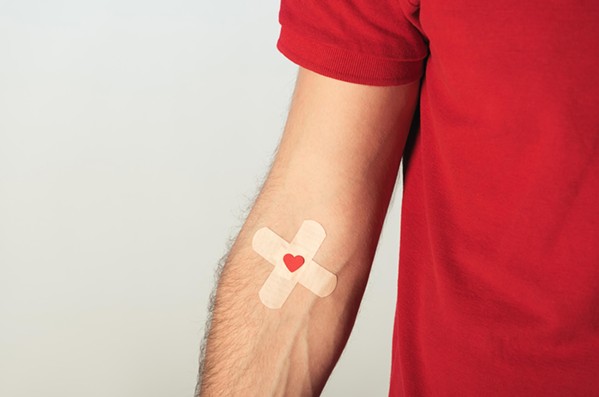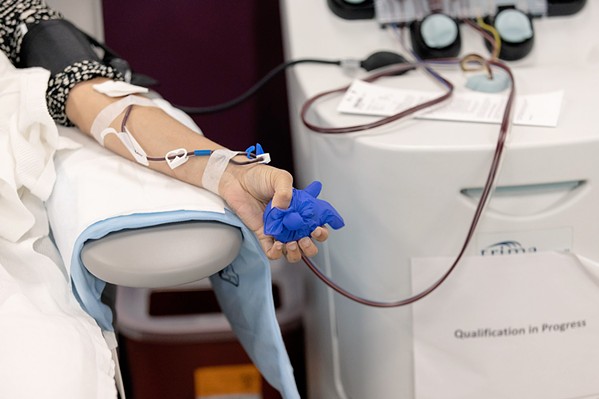Free to flow: The FDA changes guidelines for LGBTQ-plus men who want to donate blood
By Bulbul Rajagopal[{
"name": "Ad - Medium Rectangle CC01 - 300x250",
"id": "AdMediumRectangleCC01300x250",
"class": "inlineCenter",
"insertPoint": "8",
"component": "2963441",
"requiredCountToDisplay": "12"
},{
"name": "Ad - Medium Rectangle LC01 - 300x250",
"id": "AdMediumRectangleCC01300x250",
"class": "inlineCenter",
"insertPoint": "18",
"component": "2963441",
"requiredCountToDisplay": "22"
},{
"name": "Ad - Medium Rectangle LC09 - 300x250",
"id": "AdMediumRectangleLC09300x250",
"class": "inlineCenter",
"insertPoint": "28",
"component": "3252660",
"requiredCountToDisplay": "32"
}]
An update to the Food and Drug Administration's (FDA) guidelines on blood donation allows a whole new cross section of people to roll up their sleeves and help those in need.
Last May, the FDA eliminated time-based postponements and screening questions posed to men who have sex with other men (MSM population). Previous instruction deemed ineligible prospective donors from the MSM population who reported having sex within three months before presenting to donate blood. Under the new FDA guidelines, gay and bisexual men in monogamous relationships are allowed to donate blood without having to abstain from sex for three months.
"We expect that some MSM who were previously deferred will be eligible to donate under the 2023 policy, and that anyone at risk of HIV infection will be deferred under this individual risk assessment," the FDA told New Times in a prepared statement sent by spokesperson Carly Kempler. "The FDA believes this policy may potentially expand the number of people eligible to donate blood, while also maintaining the appropriate safeguards to protect the safety of the blood supply."
The FDA's deferral on blood donations for men who have sex with other men dates to 1983 when it instituted a lifetime postponement. The regulation aimed to reduce the risk of HIV in the blood supply at a time when HIV-testing was limited or didn't exist. In 2015, the FDA relaxed the lifetime deferral to a 12-month period. Then, it shortened the deferral period following the most recent sexual activity with another man to three months, citing a public health emergency stemming from COVID-19.
"The updated policy [of 2023] ... is in line with policies in place in countries like the United Kingdom and Canada, both of which have similar HIV epidemiology to the U.S. and have already instituted this approach," the FDA's statement to New Times said.
Every two seconds, a patient in the United States needs blood. But fewer donors are providing blood on a regular basis, and the number of first-time donors is decreasing year after year, according to the American Red Cross and blood donation center Vitalant.
"This past January [2024] while facing a national blood shortage, we shared we've [experienced] a 40 percent decrease in blood donations over the past 20 years," said Taylor Poisall, the American Red Cross spokesperson for the Central Coast region.
But the FDA's recommendation to remove questions based on sexual orientation could change that. While it's hard to quantify the response from the LGBTQ-plus community because the American Red Cross doesn't ask blood donors to identify their sexual orientation, Poisall said, several people across the country shared with the blood donation group that they were newly eligible to give blood.
San Luis Obispo County saw similar results in terms of first-time donors voluntarily sharing their experiences. According to Kevin Adler, communications manager for Vitalant, the FDA guidelines update increased the number of eligible donors in the county to 60 percent. Before Vitalant implemented the change in August 2023, the eligibility rate languished between 50 and 55 percent.
"Now, the questionnaire asks all prospective donors, gender-inclusive, individual-based questions that assesses blood donor eligibility," Adler said. "Even if any person has had sex with multiple sexual partners within the three-month period, they will be asked specific questions about their sexual activity. It's not specific to a gay or bisexual man anymore."
Adler said that the individual donor assessment that impacted gay and bisexual men was one of two changes from 2023 that drastically increased local eligibility.
"The other one was the permanent deferral of those who lived or were in certain European countries for an extended period of time due to mad cow disease," he said. "Now the FDA thinks they can donate right away. Before those two changes by the FDA, it was down to 40 percent of the population that was eligible to donate."
Vitalant organizes an average of 12 blood drives a week across SLO County with dozens more in Monterey, Santa Barbara, and Ventura counties.
As of April 5, it comprised 2,907 active donors—people who've given blood at least once over the last 12 months—across the Central Coast. The pre-pandemic average for a rolling 12-month period used to be 3,600 active donors. Before the pandemic, Vitalant witnessed nearly 10,000 new donors a year. In 2021 and 2022, that number dropped to below 7,000 along the Central Coast—inching up to 7,186 first-time donors in 2023.
"We've seen a 25 percent drop in business-related blood drives," Adler said. "On top of that, we're still seeing lower levels of school-related blood drives. While many schools have returned to host blood drives, it's still not to the numbers of pre-pandemic levels."
The region's aging donor population also plays a part in stagnating blood donor numbers. They don't encourage and educate the next generation to donate as robustly as they used to, Adler added.
Vitalant was at the forefront of advocating for more research into donor eligibility. It teamed up with the American Red Cross and OneBlood to conduct a pilot study funded by the FDA called the ADVANCED Study, which stands for "Assessing Donor Variability And New Concepts in Eligibility." Yet to be peer-reviewed, the study sought to determine if a blood donor history questionnaire based on individual risk would be as effective as a time-based postponement in reducing the likelihood of HIV among gay and bisexual men who volunteer to donate blood. It became the first stepping stone of data that informed the FDA's decision to update its guidelines.
Adler said that all donated blood in the country undergoes a series of tests to make sure the donation is safe to give and receive. Vials of Vitalant's supply undergoes testing in Arizona. Once cleared, Vitalant releases the lion's share of the blood donated on the Central Coast to local patients for transfusion.
Still, the new FDA guidelines stress monogamy for gay and bisexual men who are potential blood donors. The Vitalant questionnaire also asks possible donors questions about needle use and if they had sexual contact with anyone who received "money, drugs, or other payment for sex" in the past three months.
"While there are tests, the tests are not 100 percent foolproof," Adler said. "They are tested to great accuracy but there is a percentage of risk still involved."
Blood banks aren't alone in their advocacy for more scientific evidence to support blood donor policies. For the past 40 years, Access Support Network—a SLO-based nonprofit with an expanded network in Monterey County—has offered resources to people living with HIV and AIDS.
Executive Director David Kilburn said the blood donation eligibility restriction on the MSM population has been a long-contested issue in the HIV-advocacy world.
"We're always looking to try to reduce stigma," he said. "It was a tough point to sell to people who didn't believe or were, for any reason, against the gay community thinking it was immoral or whatever. It was a challenge, always, to educate people but we've been doing that for many years."
With the help of online enrollment programs like MISTR.com and SISTR.com, the Access Support Network provides pre-exposure prophylaxis (PrEP)—daily HIV-preventative medication—to HIV-negative clients prone to exposure. While Kilburn said he appreciates the progress made through the FDA guidelines, he added that men who have sex with multiple partners within three months of wanting to donate blood are still ineligible even if they proactively take PrEP. It's the next step of advocacy, according to him.
"There are several requirements if you're on PrEP, and that is quarterly testing for other STIs, ... but they're doing HIV testing as well every three months," Kilburn said. "I think somebody that chooses to go on PrEP is caring about their health immensely." Δ
Reach Staff Writer Bulbul Rajagopal at [email protected].
Latest in News
Readers also liked…
-

Coast Unified teachers upset over new position's salary and qualifications
Oct 20, 2022 -

SLO police identify alleged driver who hit and killed couple
Dec 22, 2022 -

When the levee breaks: Oceano residents, county officials walk a tightrope of regulations to manage Arroyo Grande Creek, which some say led to the levee's failure in January
May 18, 2023











